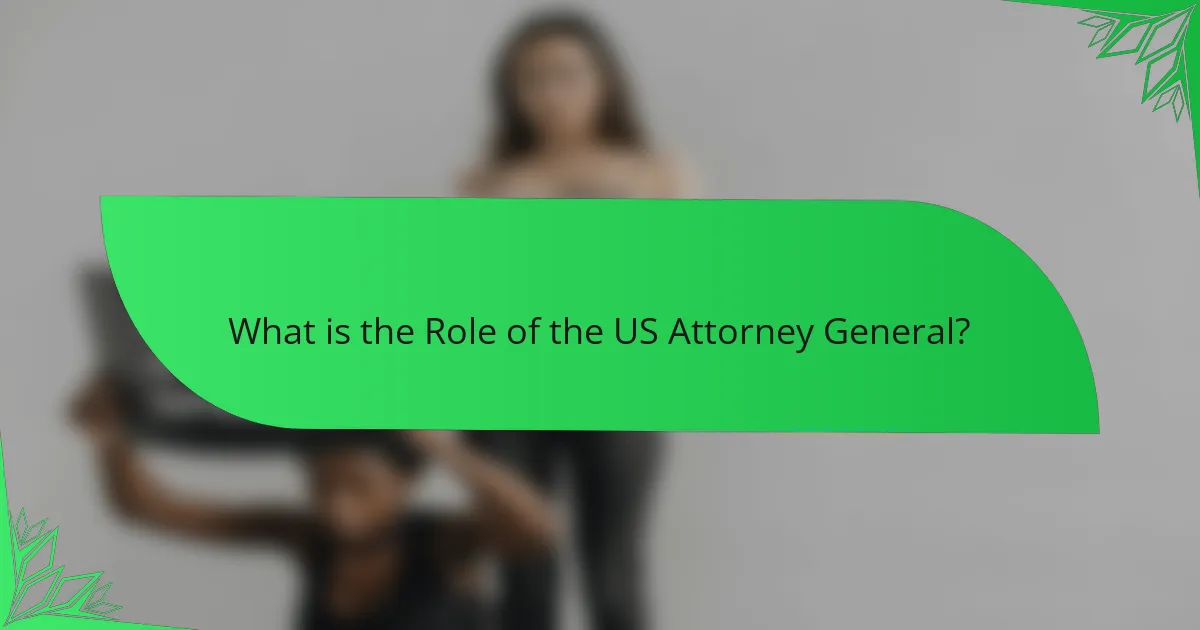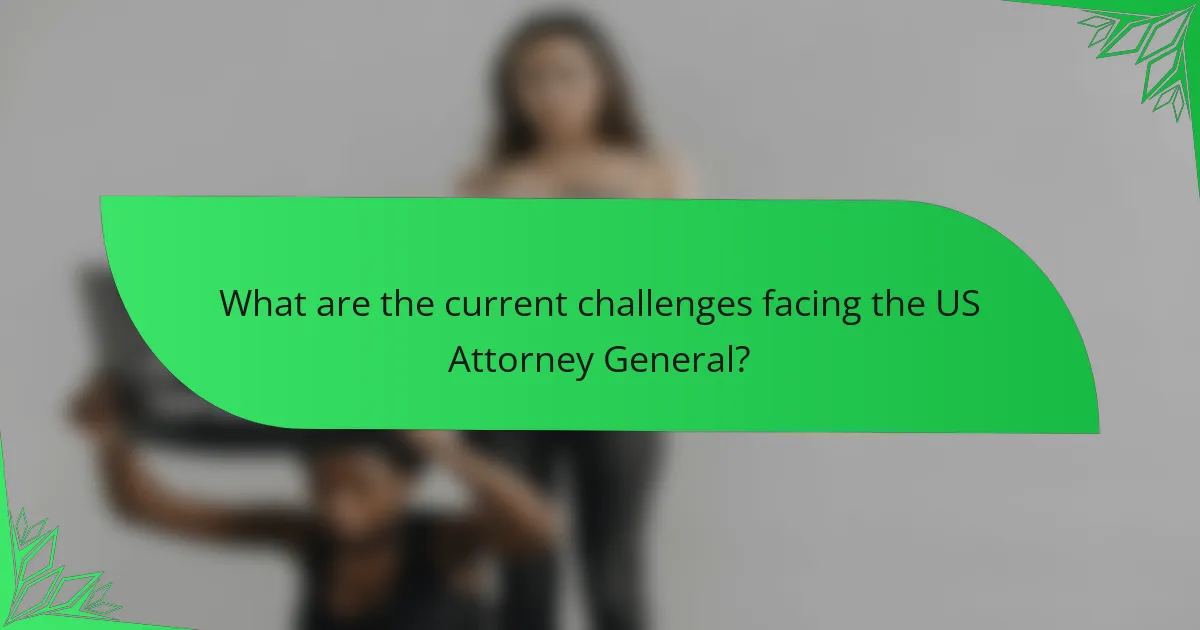The US Attorney General is the head of the Department of Justice, responsible for enforcing federal laws and representing the United States in legal matters. This role includes providing legal advice to the President, overseeing federal prosecutors, and ensuring the fair administration of justice. The Attorney General’s influence extends to significant legal policies, civil rights protections, and criminal justice reforms. Current challenges faced by the Attorney General include rising crime rates, immigration enforcement, and the need to balance national security with civil liberties, all while navigating political polarization and addressing systemic issues within the justice system.

What is the Role of the US Attorney General?
The US Attorney General serves as the head of the Department of Justice. This position is responsible for enforcing federal laws. The Attorney General represents the United States in legal matters. They provide legal advice to the President and executive branch agencies. The role includes overseeing federal prosecutors and law enforcement agencies. Additionally, the Attorney General ensures fair and impartial administration of justice. Historically, this role has evolved to address various legal challenges. The Attorney General’s decisions can significantly impact national legal policies and civil rights.
What are the primary responsibilities of the US Attorney General?
The primary responsibilities of the US Attorney General include overseeing the Department of Justice and serving as the chief law enforcement officer of the federal government. The Attorney General represents the United States in legal matters and ensures the enforcement of federal laws. They provide legal advice to the President and executive branch agencies. The Attorney General also oversees federal prosecutors and law enforcement agencies. Additionally, they handle civil rights enforcement and oversee immigration and naturalization proceedings. The role includes managing the federal prison system and addressing issues like drug enforcement. These responsibilities are critical for maintaining law and order and upholding justice in the country.
How does the US Attorney General enforce federal laws?
The US Attorney General enforces federal laws through various mechanisms. The Attorney General oversees the Department of Justice (DOJ), which implements and upholds federal laws. This includes prosecuting federal crimes and representing the United States in legal matters. The Attorney General also provides legal advice to the President and federal agencies. Additionally, the Attorney General can initiate investigations into violations of federal law. The role includes enforcing civil rights laws and ensuring compliance with federal regulations. The Attorney General’s authority is established under Title 28 of the United States Code. This ensures that federal laws are uniformly applied across the nation.
What role does the US Attorney General play in legal representation for the government?
The US Attorney General serves as the chief legal officer for the federal government. This role includes representing the government in legal matters, including court cases. The Attorney General oversees the Department of Justice and ensures that federal laws are enforced. They provide legal advice to the President and executive branch agencies. The Attorney General also plays a key role in formulating legal policies. Additionally, they may intervene in cases of significant public interest. This position is vital for maintaining the rule of law in the United States. The Attorney General’s authority is rooted in federal statutes and the Constitution.
What legal authority does the US Attorney General possess?
The US Attorney General possesses the legal authority to enforce federal laws. This authority includes overseeing the Department of Justice and representing the United States in legal matters. The Attorney General can initiate and conduct litigation on behalf of the government. They also have the power to issue legal opinions and guidance on federal law. Additionally, the Attorney General can supervise federal prosecutors and coordinate law enforcement efforts. This role is established under Title 28 of the United States Code. The Attorney General is appointed by the President and confirmed by the Senate, ensuring accountability.
How does the US Attorney General influence federal criminal prosecutions?
The US Attorney General influences federal criminal prosecutions by overseeing the Department of Justice (DOJ). This role includes setting priorities for federal law enforcement. The Attorney General can direct investigations and prosecutions. They also establish policies that guide prosecutorial discretion across the country.
For instance, the Attorney General can prioritize certain types of crimes, such as drug offenses or civil rights violations. This prioritization affects how resources are allocated within the DOJ. The Attorney General’s decisions on legal interpretations can shape the outcomes of cases.
Additionally, the Attorney General has the authority to intervene in specific cases when deemed necessary. Historical examples include the Attorney General taking action in civil rights cases in the 1960s. This illustrates the significant impact the Attorney General has on federal criminal justice.
What powers does the US Attorney General have in civil cases?
The US Attorney General has the power to initiate and prosecute civil cases on behalf of the federal government. This includes enforcement of federal laws and regulations. The Attorney General can represent the United States in civil litigation involving federal statutes. They also oversee legal actions related to civil rights violations. Additionally, the Attorney General can intervene in pending civil cases to protect federal interests. The authority extends to seeking remedies such as injunctions or monetary damages. The powers are defined under various federal statutes, including the Civil Rights Act. These powers ensure the Attorney General plays a critical role in upholding federal law in civil matters.
How has the role of the US Attorney General evolved over time?
The role of the US Attorney General has evolved significantly since its inception in 1789. Initially, the Attorney General primarily provided legal advice to the President and federal agencies. Over time, the position gained more authority in overseeing federal law enforcement. The establishment of the Department of Justice in 1870 further expanded the role, allowing the Attorney General to lead federal prosecutions. In the 20th century, the Attorney General began to address civil rights issues, notably during the 1960s. Recent decades have seen the role adapt to new challenges, including cybercrime and terrorism. The Attorney General now also plays a crucial role in shaping national policy on legal matters. This evolution reflects changes in societal needs and the expanding scope of federal law enforcement.
What historical events have shaped the responsibilities of the US Attorney General?
The responsibilities of the US Attorney General have been shaped by several historical events. The Judiciary Act of 1789 established the role and outlined initial responsibilities. The Civil Rights Movement in the 1960s expanded the Attorney General’s role in enforcing civil rights laws. The Watergate scandal in the 1970s emphasized the need for accountability and oversight within the executive branch. The September 11 attacks in 2001 led to increased focus on national security and counterterrorism responsibilities. Each of these events has influenced the scope and nature of the Attorney General’s duties throughout history.
How have landmark cases influenced the authority of the US Attorney General?
Landmark cases have significantly shaped the authority of the US Attorney General. Cases such as United States v. Nixon established the principle that the president is not above the law. This ruling reinforced the Attorney General’s role in upholding the law against executive overreach. Similarly, the case of Ashcroft v. Iqbal clarified the standards for qualified immunity, impacting how the Attorney General approaches civil rights cases. In addition, cases like Holder v. Humanitarian Law Project expanded the scope of the Attorney General’s power in national security matters. These rulings collectively enhanced the legal framework within which the Attorney General operates, solidifying their authority in various domains of law enforcement and legal interpretation.

What impact has the US Attorney General had on American law?
The US Attorney General has significantly shaped American law through enforcement and policy formulation. As the head of the Department of Justice, the Attorney General oversees federal law enforcement agencies. This role includes initiating legal actions and setting legal precedents. The Attorney General influences civil rights protections, criminal justice reforms, and regulatory enforcement. For instance, during the Civil Rights Movement, Attorney General Robert F. Kennedy played a crucial role in advancing civil rights legislation. More recently, the Attorney General has addressed issues like immigration policy and corporate accountability. The impact is evident in landmark cases and legislative changes driven by the office’s priorities.
How does the US Attorney General affect public policy?
The US Attorney General affects public policy through legal interpretation and enforcement of federal laws. This role includes advising the President and federal agencies on legal matters. The Attorney General also represents the United States in legal cases. By shaping legal precedents, the Attorney General influences future legislation and policy decisions. For example, the Attorney General’s stance on civil rights can lead to significant policy changes. Historical actions, such as the enforcement of desegregation laws, demonstrate this impact. Additionally, the Attorney General can initiate investigations that highlight public policy issues. Overall, the position serves as a crucial link between law and policy in the federal government.
What are some significant policies initiated by the US Attorney General?
The US Attorney General has initiated several significant policies. One notable policy is the implementation of the Smart on Crime initiative in 2013. This initiative aimed to reform federal drug sentencing laws. It focused on reducing mandatory minimum sentences for non-violent drug offenses. Another significant policy is the establishment of the Task Force on Crime Reduction and Public Safety in 2017. This task force aimed to enhance community safety and address violent crime. Additionally, the Attorney General has emphasized the importance of civil rights protections. This includes policies to combat discrimination and promote equal justice under the law. These policies reflect the evolving priorities of the Department of Justice under various administrations.
How does the US Attorney General’s stance on issues influence national debates?
The US Attorney General’s stance on issues significantly shapes national debates. This influence arises from the Attorney General’s role as the chief legal advisor to the government. Their opinions and legal interpretations often guide public policy and legislative discussions. For example, the Attorney General’s position on civil rights has historically impacted legislation and public opinion. When the Attorney General advocates for specific legal interpretations, it can mobilize support or opposition from various stakeholders. Additionally, high-profile cases led by the Attorney General can bring national attention to pressing issues. This was evident during the debates on immigration reform and drug policy. The Attorney General’s statements can also frame the narrative in media coverage, affecting public perception. Thus, the Attorney General plays a crucial role in influencing the direction and tone of national debates.
What controversies have surrounded the US Attorney General’s office?
The US Attorney General’s office has faced several controversies over the years. One major controversy involved the handling of the Fast and Furious gun-running operation. This operation, initiated under the Bush administration, continued under Attorney General Eric Holder. It aimed to track illegal gun sales to Mexican drug cartels but resulted in lost firearms and increased violence.
Another controversy arose during the tenure of Attorney General William Barr. His summary of the Mueller Report on Russian interference in the 2016 election was criticized for being misleading. Many argued that it downplayed the report’s findings, leading to public distrust.
Additionally, the use of federal law enforcement against protesters during the George Floyd demonstrations sparked significant backlash. Critics accused the Attorney General’s office of overreach and politicization of law enforcement.
These controversies illustrate ongoing challenges and scrutiny faced by the US Attorney General’s office. Each incident has raised important questions about accountability, transparency, and the role of the Attorney General in American democracy.
How have political appointments impacted the US Attorney General’s role?
Political appointments have significantly influenced the US Attorney General’s role by aligning legal priorities with the administration’s agenda. Appointed by the President, the Attorney General often reflects the political ideology of the current administration. This alignment can lead to shifts in enforcement priorities, such as changes in civil rights, environmental regulations, or criminal justice policies. For instance, the Obama administration emphasized civil rights and healthcare enforcement, while the Trump administration focused on immigration and deregulation. Historical context shows that these shifts can alter the Department of Justice’s operational focus and resource allocation. Additionally, political appointments can impact the Attorney General’s independence, as seen in instances of resignations or firings during politically sensitive investigations.
What are notable scandals involving the US Attorney General?
Notable scandals involving the US Attorney General include the Fast and Furious operation and the firing of US Attorneys. Fast and Furious was a botched gun trafficking investigation that led to the sale of firearms to Mexican drug cartels. The operation resulted in significant criticism and the resignation of Attorney General Eric Holder in 2013.
Another scandal involved the dismissal of several US Attorneys in 2006. This led to allegations of political motivations behind the firings. The controversy raised questions about the independence of the Justice Department. The scandal prompted investigations by Congress and the media.
These incidents highlight the challenges and scrutiny faced by the office of the US Attorney General. They also underscore the importance of accountability in the role.

What are the current challenges facing the US Attorney General?
The current challenges facing the US Attorney General include managing rising crime rates and addressing public safety concerns. The Attorney General also faces scrutiny over immigration enforcement policies. Balancing national security with civil liberties is another significant challenge. Additionally, the Attorney General must navigate political polarization affecting the justice system. Ongoing issues related to systemic racism and police reform further complicate the role. The Attorney General’s ability to secure funding for law enforcement initiatives is also a pressing concern. Each of these challenges requires careful consideration and strategic action to uphold the rule of law effectively.
How does the US Attorney General address modern legal issues?
The US Attorney General addresses modern legal issues by enforcing federal laws and ensuring justice. This role involves overseeing the Department of Justice and its various divisions. The Attorney General also provides legal advice to the President and federal agencies. They lead initiatives on pressing issues such as civil rights, cybersecurity, and drug enforcement. The Attorney General often collaborates with state and local law enforcement agencies. They may also engage in litigation to protect the public interest. Recent actions include addressing systemic racism and combating human trafficking. The Attorney General’s decisions shape national legal policy and influence public safety.
What are the implications of technology on the US Attorney General’s responsibilities?
Technology significantly impacts the responsibilities of the US Attorney General. It introduces new challenges in cybersecurity, requiring the Attorney General to address threats to national security. The rise of digital evidence alters how investigations are conducted. The Attorney General must adapt to changes in data privacy laws and regulations. Technology also facilitates the prosecution of cybercrimes, demanding specialized knowledge and resources. Additionally, the Attorney General oversees the enforcement of laws related to emerging technologies, such as artificial intelligence and data protection. These implications necessitate a proactive approach to legal frameworks and interagency collaboration. Overall, technology reshapes the landscape of legal enforcement and public safety.
How does the US Attorney General respond to civil rights concerns?
The US Attorney General responds to civil rights concerns by enforcing federal laws that protect civil rights. This includes investigating violations and taking legal action against discriminatory practices. The Attorney General also issues guidance on civil rights issues to federal agencies. Additionally, the office collaborates with state and local authorities to address civil rights violations. Historical actions include landmark cases that have shaped civil rights law. For example, the Attorney General’s involvement in the Civil Rights Movement was pivotal in enforcing desegregation laws. These actions demonstrate the commitment to uphold civil rights protections across the nation.
What best practices can be adopted by the US Attorney General’s office?
The US Attorney General’s office can adopt several best practices to enhance its effectiveness. Implementing data-driven decision-making can improve case prioritization. Regular training programs for staff ensure they remain knowledgeable about evolving laws. Establishing clear communication channels fosters transparency and accountability. Collaborating with local and state law enforcement enhances community relations. Utilizing technology for case management streamlines operations. Conducting regular audits ensures compliance with ethical standards. Engaging in public outreach builds trust with the community. These practices align with the office’s mission to uphold justice effectively.
How can the US Attorney General improve community relations?
The US Attorney General can improve community relations by fostering transparency and engagement with local communities. Implementing community outreach programs helps build trust. Regular town hall meetings allow for direct communication with citizens. Establishing partnerships with local organizations enhances collaboration. Training staff on cultural competency promotes understanding of diverse communities. Utilizing social media platforms for communication increases accessibility. These strategies have been shown to reduce tensions and improve public perception of law enforcement. Research indicates that community-oriented policing significantly enhances trust between communities and law enforcement agencies.
What strategies can enhance the effectiveness of the US Attorney General’s office?
Enhancing the effectiveness of the US Attorney General’s office can be achieved through strategic reforms and initiatives. Implementing data-driven decision-making can improve case management and resource allocation. Strengthening partnerships with local and state law enforcement agencies can enhance collaboration on investigations. Increasing transparency in operations can build public trust and accountability. Fostering a culture of continuous training can ensure staff remain updated on legal developments. Expanding community outreach programs can improve public engagement and awareness of legal rights. Prioritizing diversity and inclusion within the office can lead to better representation and understanding of various communities. These strategies collectively contribute to a more effective and responsive Attorney General’s office.
The US Attorney General is the head of the Department of Justice, responsible for enforcing federal laws and representing the United States in legal matters. This article outlines the primary responsibilities of the Attorney General, including overseeing federal prosecutors, managing civil rights enforcement, and shaping national legal policies. It explores the historical evolution of the role, significant legal authority, and the impact of landmark cases on American law. Additionally, the article addresses current challenges, controversies, and best practices for enhancing community relations and effectiveness within the office.
